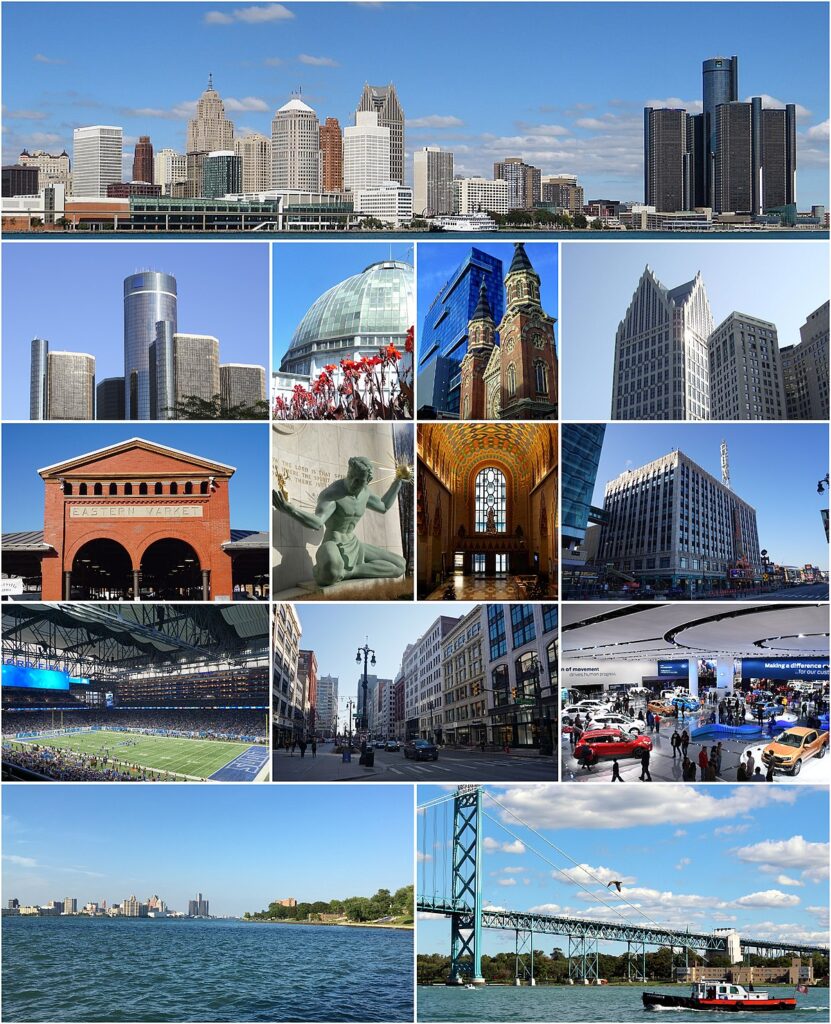
Moving to Detroit, Michigan: A Comprehensive Relocation Guide
Considering moving to Detroit, Michigan? This historic city offers urban revival, automotive heritage, and exceptional affordability. With approximately 639,000 residents in 2025 (metro 4.3 million+), Detroit combines Motor City legacy with renaissance energy and Michigan’s largest city character.
Demographic Profile to Consider If Moving to Detroit:
Detroit’s 2025 population is approximately 639,000 residents, making it Michigan’s largest city, with the metro exceeding 4.3 million. The median age is around 35 years, with diverse families, young professionals, artists, entrepreneurs, and working-class residents. The population is approximately 78% Black or African American, 14% White, 7% Hispanic, 1% Asian. Detroit features distinct neighborhoods from revitalized downtown and Midtown to challenged areas to stable neighborhoods, automotive heritage, urban revival energy, and serves as Michigan’s economic and cultural capital. The city attracts young professionals seeking urban affordability and opportunity, entrepreneurs drawn to low costs and revival energy, artists and creatives, diverse working families, and those wanting authentic urban living. Detroit appeals to those prioritizing affordability, urban character, opportunity, diversity, and believing in the comeback story. The community balances automotive heritage with renaissance, challenges with opportunity, and maintaining resilient character. Find trusted local services for moving, living, and working in Detroit.Detroit Relocation Directory
Cost of Living to Consider If Moving to Detroit:
Detroit offers exceptional affordability among major metros. Median home values range from $75,000 to $250,000 in 2025, varying dramatically by neighborhood from very affordable to revitalized areas commanding premiums, providing tremendous opportunity. The median household income is approximately $35,000. Rental properties average $800 to $1,600 monthly. Michigan has flat income tax 4.25%. Property taxes are significant though home values are low. Overall cost of living is very competitive for major city amenities, making Detroit highly attractive for young professionals, entrepreneurs, artists, and those seeking major metro affordability with opportunity. The city provides tremendous value though neighborhood selection is critical.
Economy and Job Market:
Detroit’s economy includes automotive (Big Three headquarters – GM, Ford, Stellantis), healthcare, technology, entrepreneurship, and services. Major employers include General Motors (Renaissance Center headquarters), Stellantis, Henry Ford Health System, Detroit Medical Center, Quicken Loans/Rock Ventures (Dan Gilbert’s companies driving downtown revival), automotive suppliers, and growing startups. Healthcare dominates employment. Automotive remains significant. Tech sector growing. Entrepreneurship thriving with low costs. Typical industries include automotive, healthcare, technology, entrepreneurship, and services. Wages vary dramatically. The job market attracts automotive engineers, healthcare workers, entrepreneurs, tech workers, and those seeking opportunity. The low costs enable entrepreneurship and startups impossible elsewhere.
Education:
Detroit Public Schools Community District serves city students. School quality varies dramatically requiring extensive research with some excellent schools and significant challenges. Wayne State University offers comprehensive programs. University of Detroit Mercy provides education. The educational infrastructure presents challenges though options exist for those researching carefully.
Recreation and Lifestyle:
Detroit offers VIBRANT DOWNTOWN REVIVAL with Campus Martius, restaurants, and urban energy, revitalized Midtown with Wayne State University creating college atmosphere, Detroit Institute of Arts (world-class art museum), Motown Museum celebrating music heritage, Eastern Market (historic farmer’s market), and RenCen (GM headquarters). The city features professional sports including Lions (Ford Field), Tigers (Comerica Park), Red Wings and Pistons (Little Caesars Arena), Belle Isle park island in Detroit River, diverse neighborhoods each with character, exceptional affordable housing enabling ownership, entrepreneurial energy, and authentic urban character. Residents enjoy exceptional major metro affordability, professional sports teams, urban revival energy downtown and Midtown, Motown heritage, diverse authentic character, entrepreneurial opportunity with low costs, and being part of comeback story. The lifestyle emphasizes affordability enabling opportunity, urban character and diversity, entrepreneurship and creativity, professional sports, automotive heritage pride, and resilient community. The four-season Michigan climate features cold winters and hot summers. The community fiercely values resilience and comeback pride, automotive heritage (Motor City identity), Motown music legacy, professional sports teams, entrepreneurial spirit, and believing in Detroit’s future. Living in Detroit means accepting significant urban challenges in many areas, dramatic neighborhood variation requiring extensive research, struggling schools necessitating private options or careful public school selection, some areas with high crime, harsh winters, and infrastructure challenges while experiencing EXCEPTIONAL MAJOR METRO AFFORDABILITY enabling homeownership and entrepreneurship impossible elsewhere, vibrant downtown and Midtown revival, professional sports creating city pride, Motown music heritage, automotive legacy, entrepreneurial opportunity with low costs attracting startups, authentic urban character, and comeback energy creating opportunity for those believing in the city where Motor City heritage meets urban revival and exceptional affordability defines America’s greatest comeback story.
Healthcare and Services:
Detroit residents access world-class healthcare through Henry Ford Hospital, Detroit Medical Center facilities, Beaumont hospitals, and comprehensive medical infrastructure. The healthcare system is extensive.
Transportation:
Detroit is accessed via Interstate 94, Interstate 75, Interstate 96, and various corridors. Coleman A. Young International Airport provides limited service. Detroit Department of Transportation (DDOT) and SMART operate bus service. QLine streetcar serves downtown/Midtown. People Mover serves downtown. Most residents use personal vehicles though downtown/Midtown offer walkability. Biking growing. Typical commute times within metro are 25-50 minutes.
Conclusion:
Moving to Detroit in 2025 offers major metro living with exceptional affordability, urban revival energy, and opportunity. The city’s combination of Motor City heritage, downtown renaissance, and unmatched affordability makes it ideal for young professionals, entrepreneurs, and believers seeking America’s greatest comeback story where automotive legacy meets urban revival and exceptional affordability creates opportunity defining Michigan’s resilient and dynamic capital.

